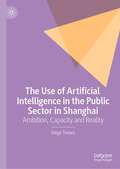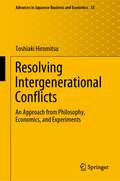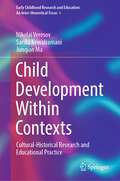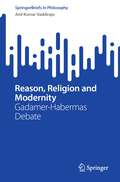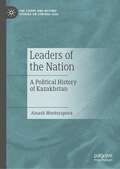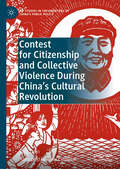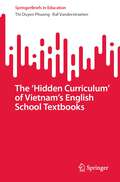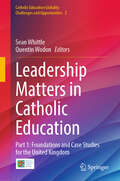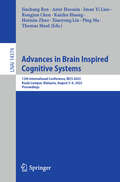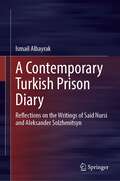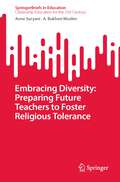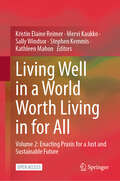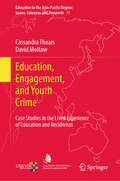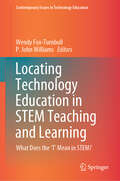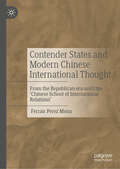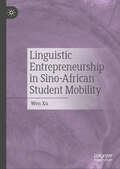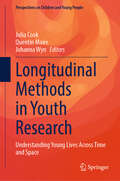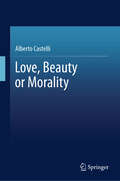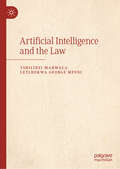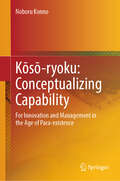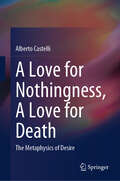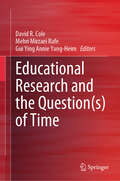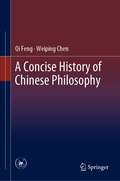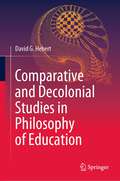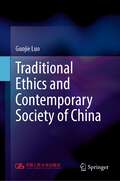- Table View
- List View
The Use of Artificial Intelligence in the Public Sector in Shanghai: Ambition, Capacity and Reality
by Diego TodaroThis book examines how Shanghai aims to improve public service provision by accelerating the use of artificial intelligence (AI) in the public sector. After clarifying the technical and social factors that shape the use of AI in this area, the book delves into the AI policy environment and AI ecosystem of Shanghai to gauge the city’s capacity to implement public sector AI applications. Then it examines how this capacity translates into real-world policy initiatives through the investigation of case studies. It highlights the analytical, operational and political capabilities that determine the strengths and limitations of such initiatives in deploying AI in the public sector, and it assesses their impacts on public service provision in Shanghai. By using the findings on Shanghai to gain a deeper understanding of key topics in public sector AI research, this book also contributes new knowledge about the use of AI to improve the provision of public services.
Resolving Intergenerational Conflicts: An Approach from Philosophy, Economics, and Experiments (Advances in Japanese Business and Economics #33)
by Toshiaki HiromitsuThis book is an unprecedented consideration of the challenges of what we can do for generations yet to come. Many growing intergenerational conflicts of interest, such as climate change and fiscal sustainability, are the result of the historically new progress of increasing human power, and the resolution of those conflicts demands a new intergenerational ethic. The book offers fresh new ideas for resolving intergenerational conflicts through the exploration of an entirely new field, conceptualized in philosophy, developed in economics, and tested in experiments. In particular, this work develops the theory of intergenerational cooperation based on a new relationship of direct reciprocity between generations. From experimental results, the possibility of intergenerational cooperation through Kantian categorical imperative is shown. The book also examines the effectiveness of inviting representatives of future generations, which are called "imaginary future generations", into the deliberations for current policy decisions. The original Japanese edition of this book was awarded the 66th Nikkei Prize for Excellent Books in Economic Science. The prize was established in 1958 to contribute to the advancement of academics and knowledge in the fields of economics, management, and accounting, as well as to its general dissemination and application.
Child Development Within Contexts: Cultural-Historical Research and Educational Practice (Early Childhood Research and Education: An Inter-theoretical Focus #6)
by Nikolai Veresov Sarika Kewalramani Junqian MaThis book examines the pedagogical encounters within children's ecological and socio-cultural historical contexts, and aspects of playful learning and development within these contexts. It addresses research and practices varying across learning contexts, providing easily adaptable exemplary practices leading to children's positive learning and development. The book offers a unified general cultural-historical theoretical model for exploring new contexts at different stages of children's learning and development. It suggests studying contexts as a source of development, as social situations of development. It analyzes play, early learning and the transition from play to school learning. It also explores the role of teachers and parents in supporting the development of executive functions, digital literacy, creative inquiries, problem solving and creativity as necessary and important prerequisites of children's school academic achievements. This volume contributes to the discourse on how children's learning is shaped in the 21st century era. It equips educators and parents with new and effective methods of creating developing contexts in their daily practice and to fully utilize the developing potential of existing contexts.
Reason, Religion and Modernity: Gadamer-Habermas Debate (SpringerBriefs in Philosophy)
by Anil Kumar VaddirajuThis book deals with the question of understanding religion and its relationship with politics in the context of developing countries. It reviews specific theories, such as modernisation theory, marxism, liberalism, hermeneutics and critical approach to explain questions related to religion and religious traditions. The book focuses on the recent attempts to theorise religion by Jurgen Habermas. It argues modernisation and orthodox Marxian theory are inadequate in understanding the recent spurt of religious phenomenon in politics. It discusses Hans-Georg Gadamer’s view to show a way forward regarding dialectical hermeneutics in facilitating a dialogue between different traditions and religions. The book is of interest to students, scholars, practitioners of development, and all those who concern themselves with the questions of religion, tradition, modernity and secular well-being in developing countries such as India and beyond.
Leaders of the Nation: A Political History of Kazakhstan (The Steppe and Beyond: Studies on Central Asia)
by Ainash MustoyapovaThe book tells about people who lived in an era of historical cataclysms, wars and revolutions, changes in political formations. The generation of the Kazakh intelligentsia responded to the historical challenge facing the Kazakhs at a turning point in history. These are people born at the end of the 19th century, educated in different countries and united by the idea of overcoming colonial dependence on the Russian Empire.The author aims to form a holistic view of a galaxy of outstanding personalities who, in an important historical period, were able to take responsibility for the people and their future. The history of the country is perceived through the prism of their destinies, views, activities and death.The material of the book is a biographical sketch and covers the history of Kazakhstan in the first third of the twentieth century, until the period of the Great Terror (1937–1938).
Contest for Citizenship and Collective Violence During China’s Cultural Revolution (IPP Studies in the Frontiers of China’s Public Policy)
by Yang LijunThis book has been groundbreaking for scholars of the Cultural Revolution, but hitherto was only available in Japanese and Chinese. This edition allows English-language readers to access the work for the first time. The author explains how political struggles within the state, competing sectarian interests, and other complex factors intertwined to produce various forms of collective violence that had a major impact on the political, economic, and social order of the time.
The ‘Hidden Curriculum’ of Vietnam’s English School Textbooks (SpringerBriefs in Education)
by Thi Duyen Phuong Raf VanderstraetenThis book analyzes the basic ideas and premises underlying the English textbooks used at the higher secondary school level in Vietnam from the 1980s to the present, from a sociological perspective. The dataset, upon which this book builds, consists of a collection of 18 textbooks, which belong to five sets of locally developed English textbooks for grade 10 to grade 12 students. These series were used in all public schools from the mid-1980s to the present. During this period, schooling expanded rapidly in Vietnam, while English also gained increasing prominence within the school system.This book examines the curricular content of these textbooks and presents a long-term analysis of the ‘hidden’ curricular content in light of Vietnam’s recent history and its government’s concerns about national identity.
Leadership Matters in Catholic Education: Part 1: Foundations and Case Studies for the United Kingdom (Catholic Education Globally: Challenges and Opportunities #2)
by Quentin Wodon Sean WhittleThis edited collection is the first part of a two-volume set., which focuses on leadership in Catholic education settings in the United Kingdom. It includes an overview of the importance of different types of leadership, including ‘servant-leadership’, in understanding and framing Catholic school practice, a critical survey of why leadership matters to ensuring the success of Catholic education, and a discussion of what counts as the defining characteristics of leadership in Catholic education and how this relates to the aims or philosophy of Catholic education. The chapters in this book draw from the insights and experiences of serving Catholic school leaders as well as from academics and researchers in Catholic education studies. The final two chapters provide a comparative analysis for the United Kingdom in a global perspective using data from the Organisation for Economic Co-operation and Development (OECD) . Together, the chapters argue that there is an urgent need to find, nurture, and sustain outstanding leaders for Catholic schools and colleges.
Advances in Brain Inspired Cognitive Systems: 13th International Conference, BICS 2023, Kuala Lumpur, Malaysia, August 5–6, 2023, Proceedings (Lecture Notes in Computer Science #14374)
by Jinchang Ren Amir Hussain Iman Yi Liao Rongjun Chen Kaizhu Huang Huimin Zhao Xiaoyong Liu Ping Ma Thomas MaulThis book constitutes the refereed proceedings of the International Conference on Brain Inspired Cognitive Systems, BICS 2023, held in Kuala Lumpur, Malaysia, in August 2023. The 36 full papers included in this book were reviewed and selected from 58 submissions and are organized in thematic sections as follows: Bio-inspired systems and Neural Computation; Image Recognition, Detection and Classification; Vision and Object Tracking; Data Analysis and Machine Learning and Applications.
A Contemporary Turkish Prison Diary: Reflections on the Writings of Said Nursi and Aleksander Solzhenitsyn
by Ismail AlbayrakThis book explores the religious experiences of two notable figures who endured severe trials under authoritarian regimes: Bediuzzaman Said Nursi (1877–1960) within the Islamic tradition, and Aleksander Solzhenitsyn (1918–2008) within the Russian Orthodox Christian tradition. Against the tumultuous backdrop of the twentieth century’s spiritual, social, political, and intellectual upheavals, both Nursi and Solzhenitsyn grappled with immense hardships because of their beliefs. Despite immense tribulations, both individuals demonstrated unwavering faith and resilience in the face of adversity, continuing their scholarly and literary activities. The current study centers on the dichotomy of spiritual confinement and expansiveness, illustrating how people can experience spiritual distress even without physical restraints. It explores the historical and conceptual aspects of imprisonment within Christian and Muslim perspectives, explores the reasons for Nursi and Solzhenitsyn's incarceration, examines their coping mechanisms in the face of hardship, and underscores the role of faith and spirituality. The author integrates personal experiences, particularly his own incarceration during the aftermath of the 2016 Turkish staged coup attempt, within the context of the narratives of Nursi and Solzhenitsyn. The book addresses court proceedings, release, departure from Turkey, and resettlement in Australia. Throughout, the author draws parallels between their own observations and those of Nursi and Solzhenitsyn, contributing to the broader discourse on individual spirituality and collective consciousness. The book offers insights into spiritual resilience in the face of adversity, utilizing the lives of these figures to illuminate shared human experiences. A unique collation of personal narration and scholarly reflection, it is relevant to academics and students in history, political science, sociology, Islamic and Middle Eastern studies, and to social scientists researchingthe phenomenon of exile and prison in different countries across the world. It also speaks to the work of activists and policymakers in human rights.
Embracing Diversity: Preparing Future Teachers to Foster Religious Tolerance (SpringerBriefs in Education)
by Anne Suryani A. Bukhori MuslimThis book presents a detailed discussion of Indonesian future teachers’ experience of religious diversity, tolerance and intolerance, their level of intellectual humility, and intentions to foster religious tolerance. Drawing from large-scale mixed methods research conducted in Indonesian universities involving over one thousand three hundred future teachers from diverse religious backgrounds, this book demonstrates that religion and religious beliefs can, and do, shape the way future teachers view their teaching practices and pedagogies. The book sheds light into the under-researched yet prominent issue of integrating tolerance into teacher education preparation. It is set in the largest Muslim-majority country in the world which, in recent years, has seen a gradual degradation of secularity while religion becomes more dominant across all levels and sectors of society. This novel and timely book is of interest to researchers, scholars, and students in religious studies, education, social sciences, and Asian studies, as well as anyone interested in the interplay between religion and education in the 21st century.
Living Well in a World Worth Living in for All: Volume 2: Enacting Praxis for a Just and Sustainable Future
by Stephen Kemmis Kathleen Mahon Mervi Kaukko Kristin Elaine Reimer Sally WindsorThis open access book is the second of a two-volume series that explores how people are living well and creating a “World Worth Living in for All”. It engages in deep listening of voices from across the world and considers the role of education in creating a more just and sustainable world for the future. The book asks what can be learnt to create change in policy and practice in order to enact praxis. It showcases chapters from international authors who discuss current or new projects to address the overarching questions explored in the book. It also provides an overview of perspectives that connect both volumes and the individual projects presented together through the lens of practice architectures.
Education, Engagement, and Youth Crime: Case Studies in the Lived Experience of Education and Recidivism (Education in the Asia-Pacific Region: Issues, Concerns and Prospects #71)
by Cassandra Thoars David MoltowThis book presents insights into how affective educational experiences may be associated with youth criminal behaviour and the pathway to recidivism. It explores the perspectives and lived school experiences of five young adult male prison inmates, including while they were incarcerated as youths. Through these case studies, the book explores the relationship between affective engagement in education and recidivism.This book shows that participants were affectively disengaged from education prior to their initial incarceration in a youth detention facility, and that their disaffection before, during, and after youth incarceration both generated and impacted on their cognitive and behavioural disengagement from education. Moreover, a range of additional factors not directly causally related to their schooling were shown to have had a significant effect on their engagement in education. The book considers a number of key findings. First, the foundational role that a sense of belonging plays in how young people experience education and its relation to crime. Second, the importance of individualized transition plans for youth at risk, and youth offenders before, during, and after incarceration. Third, the extent to which successful transition from youth offending and recidivism hinges on interagency collaboration. This book will be beneficial to teacher educators, education researchers, criminologists and sociologists.
Locating Technology Education in STEM Teaching and Learning: What Does the ‘T’ Mean in STEM? (Contemporary Issues in Technology Education)
by Wendy Fox-Turnbull P. John WilliamsThis book offers clarity and consistency of thinking in relation to Technology Education when situated within a STEM approach to teaching. It examines the range of Innovations and Issues which are being considered by schools as they implement STEM, with particular focus on the place of Technology, or the ‘T’ in STEM. The book is divided into three sections: Philosophy, Implementation and Issues and Innovations, with each containing five to seven chapters. The first section lays the foundations for the remainder of the book: it focuses the readers on the technology aspect of STEM education and situates it to align with the international understanding of technology education. The second section provides insights into how STEM is best implemented to give technology due consideration across a range of disciplines with technology education, including engineering, food technology, and textile technology. This section also provides suggestions for the successful implementation of the STEM approach, and offers further insight through a range of case studies. The third section outlines and discusses a range of issues that pose a threat to the position and understanding of technology within the STEM teaching and learning approach. This section also examines how technology and STEM are situated within, are supported or are threatened by, other current innovations and approaches to teaching an integrated curriculum, such as the Maker Space Movement and Play-based Learning.
Contender States and Modern Chinese International Thought: From the Republican era until the ‘Chinese School of International Relations’
by Ferran Perez MenaThis book contends that the development of modern Chinese international thought has been profoundly shaped by the distinctive nature of the Chinese state as a contender state and its global positioning since 1912. The argument posited demonstrates that, notwithstanding the varied perspectives on the 'international' held by Chinese intellectuals throughout the 20th century, there exist commonalities across the periods analyzed in this book. In essence, the book emphasizes that the shared elements influencing the production of modern Chinese international thought do not derive from a unified cultural Chinese identity but rather stem from China's evolving geopolitical position in the modern world.
Linguistic Entrepreneurship in Sino-African Student Mobility
by Wen XuThis book explores African international students’ lived experience within Chinese higher education, including their language ideologies, investment in Chinese language learning and the (re)shaping of identities and aspirations. Whilst high English proficiency has been sought by globally mobile students to play the ‘class game’ and gain entrée to the circle of elites, considerably less attention has been paid to how shifting global structures and China’s semi-peripheral position shape its language learners’ investment and identity construction. Drawing upon a series of interviews, the book deciphers African students’ logics of linguistic exchanges within the geopolitical and geo-economic context of China-African relations. The students invested heavily into Chinese language learning and use, while displaying perfectionism, linguistic entrepreneurship and linguistic insecurity. As the value of their Chinese linguistic capital increases, they reassessed their sense of themselves and produced different social identities, which includes the idea of ‘the world is my oyster’, contributing to Africa’s sustainable development and the disposition to ‘tell China’s story well’. This work transgresses monolingual dominance (i.e. English) in the existing body of international student mobility and second language acquisition (SLA) research, as great importance is assigned to Chinese as linguistic capital in South-South student migration. The book is of interest to researchers in international higher education, international student mobilities, sociolinguistics, applied linguistics, languages education, and Chinese language teaching and learning.
Longitudinal Methods in Youth Research: Understanding Young Lives Across Time and Space (Perspectives on Children and Young People #15)
by Johanna Wyn Julia Cook Quentin MaireThis book addresses how longitudinal research approaches are used to understand young people’s lives. It elucidates how youth researchers use longitudinal approaches, and how longitudinal research can help us to both understand and shape the field of youth sociology. Chapters discuss the creation of knowledge about youth and how longitudinal research shapes the field of youth sociology and shed light on key tensions and emerging debates in longitudinal youth research ranging from research design to data collection, analysis, and use. It considers longitudinal studies using a broad range of methods, including qualitative, quantitative, mixed methods, retrospective methods, and creative and participatory methods. This collection offers insights from longitudinal youth scholars conducting research in Argentina, Lithuania, Australia, Estonia, Canada, the United States (US), the United Kingdom (UK), Finland and India. These researchers reflect on the future of longitudinal youth research, addressing emerging and prospective issues. This book provides a concise survey of key established and emerging areas of concern in longitudinal research and of the relationship between these areas and the field of youth studies more specifically.
Love, Beauty or Morality
by Alberto CastelliThis book is moved by two main questions. Is Love a matter of beauty or mortality? In other words, is love an ethical ideal? Also, modernity understood as the age of mechanical reproduction, has shaped not simply our cities but our very same way of feeling. How has our conception of love changed, if it has, in the past two centuries? This book is to address these questions. It is not to trace the evolution of the idea of love in Western culture, from Plato to the present day. It aims to bring to the surface different shades of love lingering at the heart of Western culture to rehabilitate the myth of love to its original credibility. Our confused civilization has split love into sensual and moral aspects but to be aware of it is perhaps to defeat a dilemma that seems so unnatural. This book is about how we make sense of our lives through love and how nineteenth and twentieth-century literature records it.
Artificial Intelligence and the Law
by Tshilidzi Marwala Letlhokwa George MpediThis textbook offers a starting point for the education of attorneys and other legal professionals about the potential impact of artificial intelligence (AI) on the law, as well as a forum for discussing artificial intelligence's legal and ethical concerns. Intended for classroom use, this book will help students, legal professionals and policymakers alike. AI is swiftly transforming the world, including the legal system. Legal applications to areas such as ethics, human rights, climate change, labor law, health, social protection, inequality, lethal autonomous weapons, the criminal justice system and autonomous vehicles, contract drafting, legal investigation, criminal analysis and evidence investigation, utilize AI. As AI becomes more sophisticated, its impact on the law will likely increase.
Kōsō-ryoku: For Innovation and Management in the Age of Para-existence
by Noboru KonnoThis book examines conceptualizing capability (kōsō-ryoku), the most important ability for thriving in the era of innovation. A new approach, "formative conceptualizing capability," is proposed as the core knowledge methodology for innovation and management, which is is a fundamental human ability that goes beyond the boundaries between cognitive and tangible realities to shape concepts and drive innovation. Traditional studies on imagination in Western philosophy are combined with knowledge creation theory based on Eastern way of thinking. The book argues the capability should be at the core of innovation management, offering insights and principles for navigating the challenges of the present age. Japan has experienced the world's earliest capitalist setback and is stuck in a prolonged stagnation. The author maintains, however, that what is needed in this coming chaotic era is not only “imagination”, as it would be called in English, but also the power of creating kōsō, the Japanese term for “formative concept”. The author has a proven track record in research and practice on knowledge creation theory, innovation management, design thinking, and scenario planning. He has reorganized and set forth in this book the perspectives he has proposed under the theme of kōsō-ryoku to present a new methodology of knowledge for living in the twenty-first century.
A Love for Nothingness, A Love for Death: The Metaphysics of Desire
by Alberto CastelliThis book aims at explaining romantic love between straight adults through literary texts of the western canon from the nineteenth and twentieth century. Each chapter comes with a multidisciplinary approach in which protagonists are mutilated in their quest for loving as alternative to annihilation. The book emphasizes love as an obsession, thus as an exploration of the mind. From the passion-myth of Tristan and Isolde to the nihilist modernist representations, the western world has created a perverse concept of love. A love for nothingness, for death. Narcissistic and at times destructive, love is gained by overcoming obstacles. If without obstacles there is no love, then love becomes love for obstacles. Within this masochistic frame, love, falling in love, being loved always stand at the edge of pathology. At its core this book narrates a love story, more precisely a story of loves, the haunting evocation of a desire that by its very nature cannot be fulfilled. Inherent in the nature of love is a subtle dialectical activity between presence and absence, between creation and destruction, reality and void. Accordingly, the narrative raises questions that the past two centuries were incapable of answering. Does love only last the time of a kiss? Is its promise fatally destined to dissolve? What about violence? Physical, emotional, temporal. Is it an ineliminable part of love or its most extreme profanation? And what is the mystery that accompanies loves that know how to last without resigning themselves to the death of desire? It is to answer some of these questions that I wrote this text. Love is an unconscious process that dominates reason and destroys it when reason cannot be a mode of communication. Hence, the amorous romance is madness and this text is written as a loud reminder.
Educational Research and the Question(s) of Time
by David R. Cole Mehri Mirzaei Rafe Gui Ying Annie Yang-HeimThis book fully explores the question(s) of time in educational research and achieves the acceleration and merging of inquiry with action to understand change and implement these findings through practice. It deals with the philosophy of education, higher education, schooling (the curriculum), time displacement, technology, the environment and policy. This book focuses on time revolution(s). It explores new ways of thinking about time, that question a linear/arrow in time, and sets into motion an educational research agenda to extract revolutions of time. Furthermore, this book figures the dimension of time in teaching and learning by extending and deepening the engagement with time in education. For example, it analyzes the climate crisis in terms of education and how the realization that the climate is changing sits parallel and adjacent to pedagogy. The climate crisis and how to do anything about it through education is an example of how considering the dimension of time opens up education beyond quick or narrow fixes and introduces a profound synthesis for the future.
A Concise History of Chinese Philosophy
by Qi Feng Weiping ChenThis book is an abridged version of Feng Qi’s two major works on the history of philosophy, The Logical Development of Ancient Chinese Philosophy and The Revolutionary Course of Modern Chinese Philosophy. It is a comprehensive history of Chinese philosophy taking the reader from ancient times to the year 1949. It illuminates the characteristics of traditional Chinese philosophy from the broader vantage point of epistemology. The book revolves around important debates including those on “Heaven and humankind” (tian ren天人), “names and actualities” (mingshi名實), “principle and vital force” (liqi理氣), “the Way and visible things” (daoqi道器), “mind and matter/things” (xinwu心物), and “knowledge and action” (zhixing知行). Through discussion of these debates, the course of Chinese philosophy unfolds. Modern Chinese philosophy has made landmark achievements in the development of historical and epistemological theory, namely the “dynamic and revolutionary theory of reflection”. However, modern Chinese philosophy is yet to construct a systematic overview of logic and methodology, as well as questions of human freedom and ideals. Amid this discussion, the question of how contemporary China is to “take the baton” from the thinkers of the modern philosophical revolution is addressed.
Comparative and Decolonial Studies in Philosophy of Education
by David G. HebertThis book introduces the educational philosophies of notable African and Asian thinkers who tend to be little recognized in Europe and North America. It offers specific resources for diversification of higher education curricula. The book expands the philosophy of education, in clear language, to include ideas of major non-western educational thinkers who are little discussed in previous publications. It includes critical analysis of non-western concepts and consideration of their relevance to schools worldwide. The book features discussions of how the work of Tagore and postcolonial thinkers offers diverse visions that increasingly inspire a decolonizing approach to education. This book offers a unique emphasis on how a decolonized philosophy of education can especially enable a rethinking of approaches to education in arts and humanities subjects.
Traditional Ethics and Contemporary Society of China
by Guojie LuoBased on the ethical thinking of the pre-Qin Dynasty, this book discusses the formation and development of traditional Chinese ethics, the refinement of the Confucian ethical normative system and the establishment of its orthodoxy, as well as the deepening and maturation of feudal ethics. The book is simple in style and clear in context. It contains not only the essence of traditional Chinese morality but also the achievements of modern civilization. It analyzes the implications of traditional Chinese ethics on the governance and moral construction of modern society and can be used as a reference for governance and revitalization of the country and moral development.
